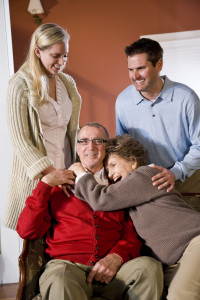Ongoing Effects of Birth Order
Sigmund Freud was the first of the psychotherapists to note that “a child’s position in the sequence of brothers and sisters is of very great significance for the course of his later life.”
Your birth order and sex determine in large part how other people in your family react to you and treat you. That, in turn, influences what you think about yourself and how you react to and treat others inside and outside the family.
Your family is your classroom for learning how to behave in the world. In the family, you learn how males and females act; how youngest or oldest children act; how different sexes and ages relate to each other. Whether or not it was an enjoyable lesson a happy home for you, you usually learn your role so well (and so unconsciously) that you live it out the rest of your life without even knowing you’ve been in “school.”
Pioneer psychologist Alfred Adler said, “It should not surprise us to learn that people do not change their attitude toward life after their infancy, though its expressions in later life are quite different from those of their earliest days.”
The family experience is so powerful in your early life that you may grow up with the firm conviction (which again may be unconscious) that the way things are in your family is as natural as water to a fish and that anything else is deviant. It is, for example, why you may think the normal way to squeeze the toothpaste tube is from the middle and your spouse is equally convinced it is from the bottom, and neither of you can understand how the other could possibly do it differently.
 “The little world of childhood with its familiar surroundings is a model of the greater world,” said Carl Jung. “The more intensively the family has stamped its character upon the child, the more it will tend to feel and see its earlier miniature world again in the bigger world of adult life. Naturally this is not a conscious, intellectual process.”
“The little world of childhood with its familiar surroundings is a model of the greater world,” said Carl Jung. “The more intensively the family has stamped its character upon the child, the more it will tend to feel and see its earlier miniature world again in the bigger world of adult life. Naturally this is not a conscious, intellectual process.”
This conviction that your way is the right way exists even if you consciously dislike your family of origin (the family one is born and raised in) and the way you were brought up. You may not like it, but it is what you are used to. One result of this may be that you will try to duplicate early family experiences, even painful ones, in other areas of your life.
Take, for example, the woman who comes from a family where either she or her mother was abused by her father and who ends up being abused in her marriage. She didn’t “look for” this kind of man (and certainly didn’t want to be abused), but since that was the kind of man she was accustomed to, he was the kind of man she felt “at home” with when she first met him.
Your experiences at home will also affect your expectations and judgments of situations and relationships. You will react to many of the events in the rest of your life the same way you reacted to them in your family. This can sometimes be dangerous.
For instance, you may assume people or events are duplicating the ones you knew as a child when they’re not like that at all. The younger son whose mother and big sister were overprotective and possessive may react resentfully when his wife asks him how his day was. He is so accustomed to women being “domineering” and “snoopy” (according to his perception of his family) that he is automatically angered by an innocent remark. The middle manager who thinks an ambitious young co-worker is trying to undermine her work to win the top boss’s favor may react the same way she did to her younger sister trying to win favor with father. In both cases, the reaction, which is to old hurts, may be inappropriate in the current context and destructive to everyone involved.
It is important, then, to be aware of how your position in your family and your early experiences have shaped you and your relationships with others. Murray Bowen, one of the originators of family systems therapy, often tells therapists that “no single piece of data is more important than knowing the sibling positions of people in the present and past generations.”
Dr. Ronald W. Richardson and Lois A. Richardson explored the influence of the birth order on our lives in their book Birth Order and You. Do you know how your sex and position in the family affect your personality, career, relationships, and parenting? Find out!





